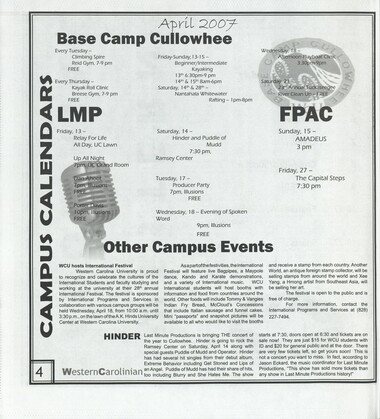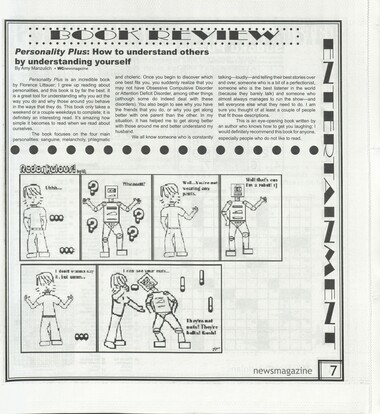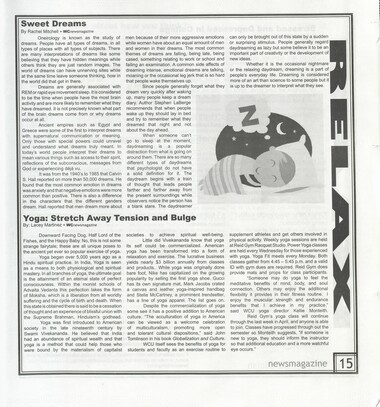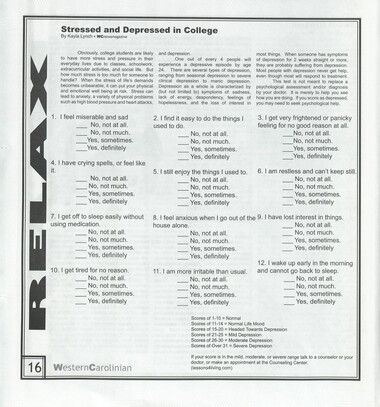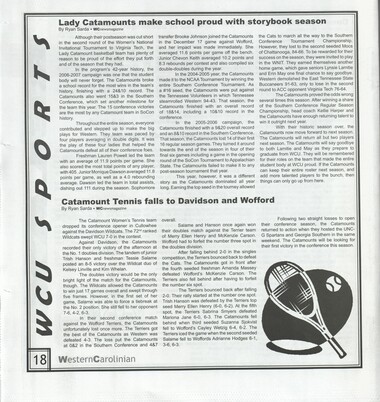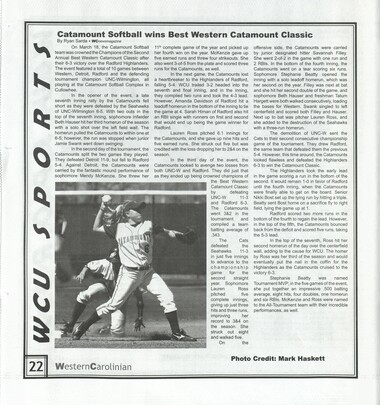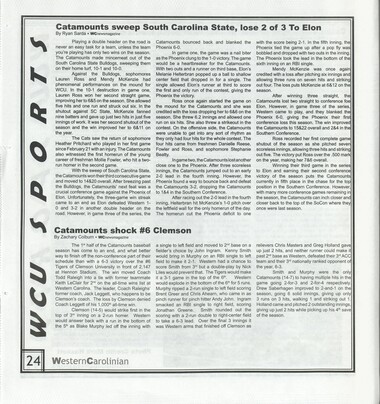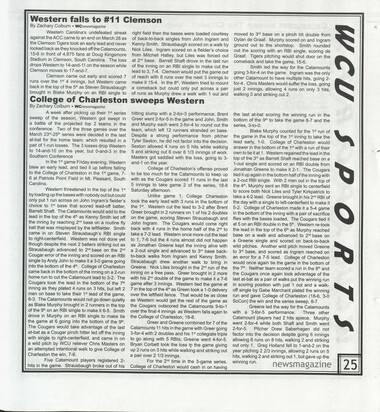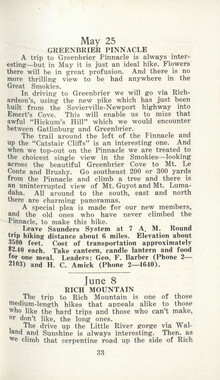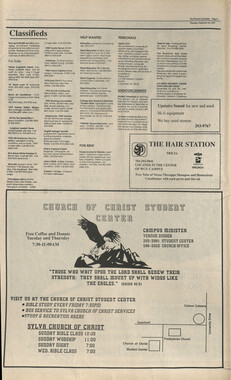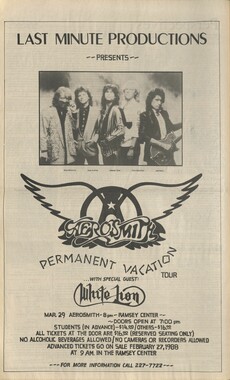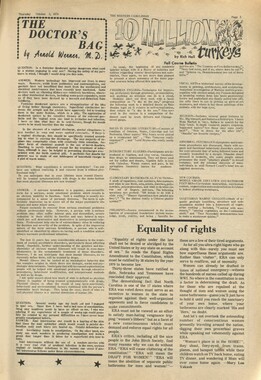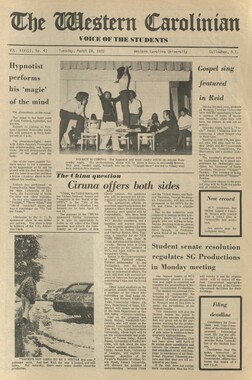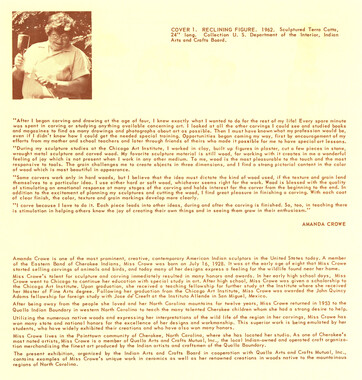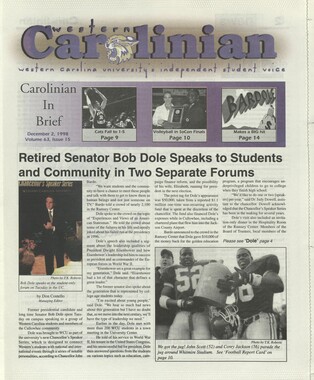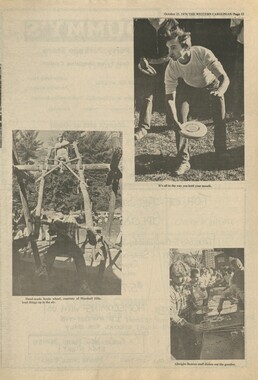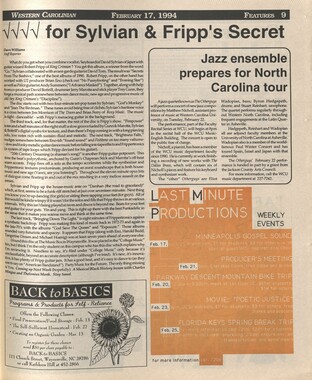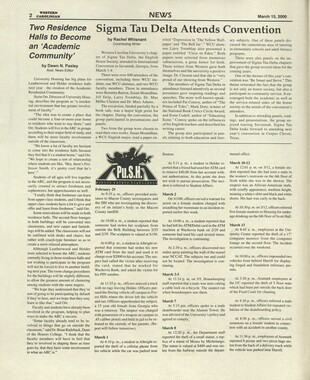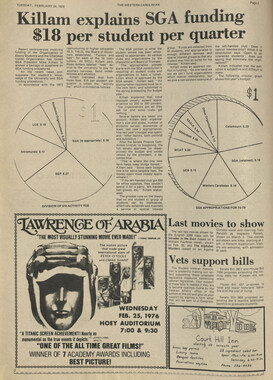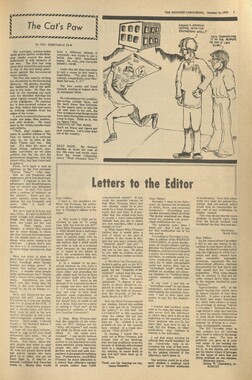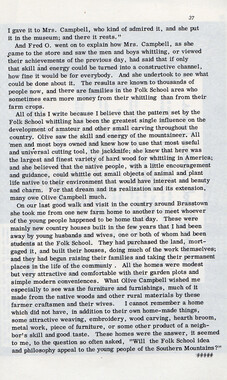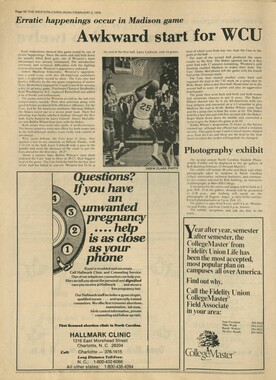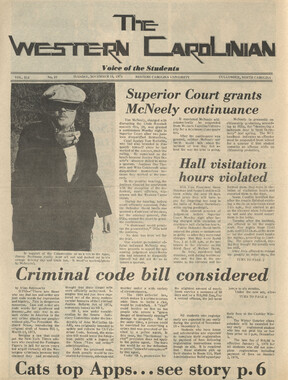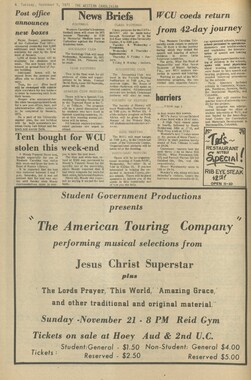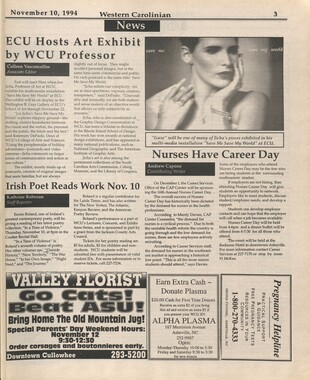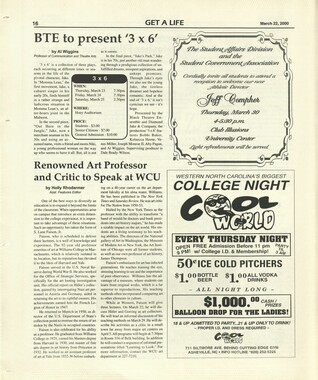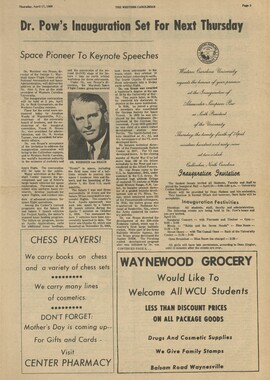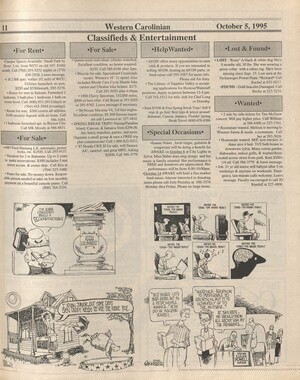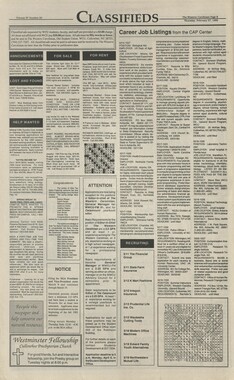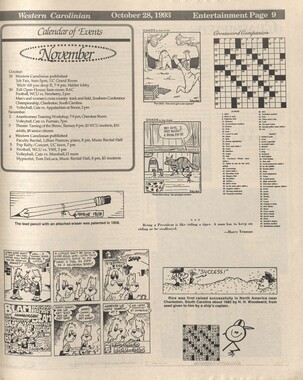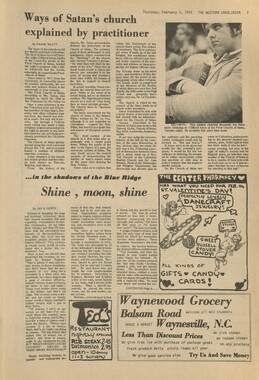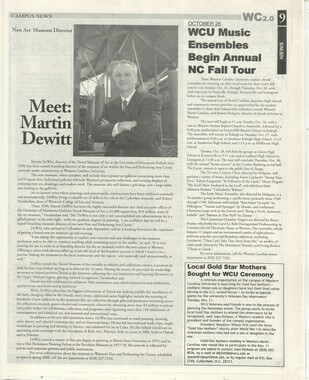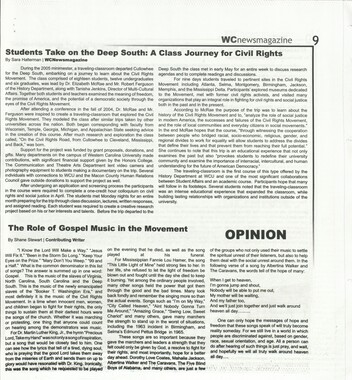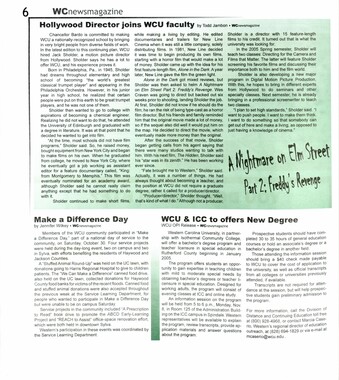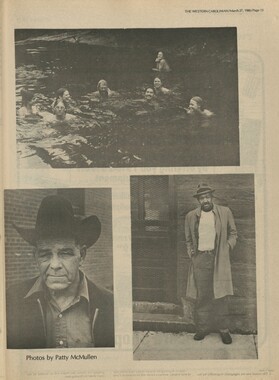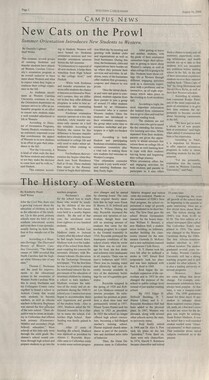Western Carolina University (21)
View all
- Canton Champion Fibre Company (2308)
- Cherokee Traditions (291)
- Civil War in Southern Appalachia (165)
- Craft Revival (1942)
- George Masa Collection (135)
- Great Smoky Mountains - A Park for America (2901)
- Highlights from Western Carolina University (422)
- Horace Kephart (941)
- Journeys Through Jackson (159)
- LGBTQIA+ Archive of Jackson County (85)
- Oral Histories of Western North Carolina (314)
- Picturing Appalachia (6798)
- Stories of Mountain Folk (413)
- Travel Western North Carolina (153)
- Western Carolina University Fine Art Museum Vitreograph Collection (129)
- Western Carolina University Herbarium (92)
- Western Carolina University: Making Memories (738)
- Western Carolina University Publications (2491)
- Western Carolina University Restricted Electronic Theses and Dissertations (146)
- Western North Carolina Regional Maps (71)
- World War II in Southern Appalachia (131)
University of North Carolina Asheville (6)
View all
- Allanstand Cottage Industries (62)
- Appalachian National Park Association (53)
- Bennett, Kelly, 1890-1974 (1463)
- Berry, Walter (76)
- Brasstown Carvers (40)
- Carver, George Washington, 1864?-1943 (26)
- Cathey, Joseph, 1803-1874 (1)
- Champion Fibre Company (233)
- Champion Paper and Fibre Company (297)
- Cherokee Indian Fair Association (16)
- Cherokee Language Program (22)
- Crowe, Amanda (40)
- Edmonston, Thomas Benton, 1842-1907 (7)
- Ensley, A. L. (Abraham Lincoln), 1865-1948 (275)
- Fromer, Irving Rhodes, 1913-1994 (70)
- George Butz (BFS 1907) (46)
- Goodrich, Frances Louisa (120)
- Grant, George Alexander, 1891-1964 (96)
- Heard, Marian Gladys (60)
- Kephart, Calvin, 1883-1969 (15)
- Kephart, Horace, 1862-1931 (313)
- Kephart, Laura, 1862-1954 (39)
- Laney, Gideon Thomas, 1889-1976 (439)
- Masa, George, 1881-1933 (61)
- McElhinney, William Julian, 1896-1953 (44)
- Niggli, Josephina, 1910-1983 (10)
- North Carolina Park Commission (105)
- Osborne, Kezia Stradley (9)
- Owens, Samuel Robert, 1918-1995 (11)
- Penland Weavers and Potters (36)
- Roberts, Vivienne (15)
- Roth, Albert, 1890-1974 (142)
- Schenck, Carl Alwin, 1868-1955 (1)
- Sherrill's Photography Studio (2565)
- Southern Highland Handicraft Guild (127)
- Southern Highlanders, Inc. (71)
- Stalcup, Jesse Bryson (46)
- Stearns, I. K. (213)
- Thompson, James Edward, 1880-1976 (226)
- United States. Indian Arts and Crafts Board (130)
- USFS (683)
- Vance, Zebulon Baird, 1830-1894 (1)
- Weaver, Zebulon, 1872-1948 (58)
- Western Carolina College (230)
- Western Carolina Teachers College (282)
- Western Carolina University (2008)
- Western Carolina University. Mountain Heritage Center (18)
- Whitman, Walt, 1819-1892 (10)
- Wilburn, Hiram Coleman, 1880-1967 (73)
- Williams, Isadora (3)
- Cain, Doreyl Ammons (0)
- Crittenden, Lorraine (0)
- Rhodes, Judy (0)
- Smith, Edward Clark (0)
- Appalachian Region, Southern (2924)
- Asheville (N.C.) (1941)
- Avery County (N.C.) (26)
- Blount County (Tenn.) (195)
- Buncombe County (N.C.) (1672)
- Cherokee County (N.C.) (283)
- Clay County (N.C.) (556)
- Graham County (N.C.) (236)
- Great Smoky Mountains National Park (N.C. and Tenn.) (525)
- Haywood County (N.C.) (3569)
- Henderson County (N.C.) (70)
- Jackson County (N.C.) (4913)
- Knox County (Tenn.) (35)
- Knoxville (Tenn.) (13)
- Lake Santeetlah (N.C.) (10)
- Macon County (N.C.) (420)
- Madison County (N.C.) (215)
- McDowell County (N.C.) (39)
- Mitchell County (N.C.) (135)
- Polk County (N.C.) (35)
- Qualla Boundary (982)
- Rutherford County (N.C.) (76)
- Swain County (N.C.) (2182)
- Transylvania County (N.C.) (270)
- Watauga County (N.C.) (12)
- Waynesville (N.C.) (86)
- Yancey County (N.C.) (72)
- Aerial Photographs (3)
- Aerial Views (60)
- Albums (books) (4)
- Articles (1)
- Artifacts (object Genre) (228)
- Bibliographies (1)
- Biography (general Genre) (2)
- Cards (information Artifacts) (38)
- Clippings (information Artifacts) (191)
- Copybooks (instructional Materials) (3)
- Crafts (art Genres) (622)
- Depictions (visual Works) (21)
- Design Drawings (1)
- Drawings (visual Works) (185)
- Envelopes (73)
- Exhibitions (events) (1)
- Facsimiles (reproductions) (1)
- Fiction (general Genre) (4)
- Financial Records (12)
- Fliers (printed Matter) (67)
- Glass Plate Negatives (381)
- Guidebooks (2)
- Internegatives (10)
- Interviews (815)
- Land Surveys (102)
- Letters (correspondence) (1013)
- Manuscripts (documents) (618)
- Maps (documents) (177)
- Memorandums (25)
- Minutes (administrative Records) (59)
- Negatives (photographs) (6090)
- Newsletters (1290)
- Newspapers (2)
- Notebooks (8)
- Occupation Currency (1)
- Paintings (visual Works) (1)
- Pen And Ink Drawings (1)
- Periodicals (193)
- Personal Narratives (10)
- Photographs (12976)
- Plans (maps) (1)
- Poetry (5)
- Portraits (4568)
- Postcards (329)
- Programs (documents) (181)
- Publications (documents) (2443)
- Questionnaires (65)
- Relief Prints (26)
- Sayings (literary Genre) (1)
- Scrapbooks (282)
- Sheet Music (2)
- Slides (photographs) (402)
- Songs (musical Compositions) (2)
- Sound Recordings (796)
- Specimens (92)
- Speeches (documents) (18)
- Tintypes (photographs) (8)
- Transcripts (322)
- Video Recordings (physical Artifacts) (23)
- Text Messages (0)
- A.L. Ensley Collection (275)
- Appalachian Industrial School Records (7)
- Appalachian National Park Association Records (336)
- Axley-Meroney Collection (2)
- Bayard Wootten Photograph Collection (20)
- Bethel Rural Community Organization Collection (7)
- Blumer Collection (5)
- C.W. Slagle Collection (20)
- Canton Area Historical Museum (2110)
- Carlos C. Campbell Collection (462)
- Cataloochee History Project (64)
- Cherokee Studies Collection (4)
- Daisy Dame Photograph Album (5)
- Daniel Boone VI Collection (1)
- Doris Ulmann Photograph Collection (112)
- Elizabeth H. Lasley Collection (1)
- Elizabeth Woolworth Szold Fleharty Collection (4)
- Frank Fry Collection (95)
- George Masa Collection (173)
- Gideon Laney Collection (452)
- Hazel Scarborough Collection (2)
- Hiram C. Wilburn Papers (28)
- Historic Photographs Collection (236)
- Horace Kephart Collection (861)
- Humbard Collection (33)
- Hunter and Weaver Families Collection (1)
- I. D. Blumenthal Collection (4)
- Isadora Williams Collection (4)
- Jesse Bryson Stalcup Collection (47)
- Jim Thompson Collection (224)
- John B. Battle Collection (7)
- John C. Campbell Folk School Records (80)
- John Parris Collection (6)
- Judaculla Rock project (2)
- Kelly Bennett Collection (1482)
- Love Family Papers (11)
- Major Wiley Parris Civil War Letters (3)
- Map Collection (12)
- McFee-Misemer Civil War Letters (34)
- Mountain Heritage Center Collection (4)
- Norburn - Robertson - Thomson Families Collection (44)
- Pauline Hood Collection (7)
- Pre-Guild Collection (2)
- Qualla Arts and Crafts Mutual Collection (12)
- R.A. Romanes Collection (681)
- Rosser H. Taylor Collection (1)
- Samuel Robert Owens Collection (94)
- Sara Madison Collection (144)
- Sherrill Studio Photo Collection (2558)
- Smoky Mountains Hiking Club Collection (616)
- Stories of Mountain Folk - Radio Programs (374)
- The Reporter, Western Carolina University (510)
- Venoy and Elizabeth Reed Collection (16)
- WCU Gender and Sexuality Oral History Project (32)
- WCU Mountain Heritage Center Oral Histories (25)
- WCU Oral History Collection - Mountain People, Mountain Lives (71)
- WCU Students Newspapers Collection (1923)
- Western North Carolina Tomorrow Black Oral History Project (69)
- William Williams Stringfield Collection (2)
- Zebulon Weaver Collection (109)
- African Americans (390)
- Appalachian Trail (35)
- Artisans (521)
- Cherokee art (84)
- Cherokee artists -- North Carolina (10)
- Cherokee language (21)
- Cherokee pottery (101)
- Cherokee women (208)
- Church buildings (190)
- Civilian Conservation Corps (U.S.) (111)
- College student newspapers and periodicals (2012)
- Dams (107)
- Dance (1023)
- Education (222)
- Floods (61)
- Folk music (1015)
- Forced removal, 1813-1903 (2)
- Forest conservation (220)
- Forests and forestry (1196)
- Gender nonconformity (4)
- Great Smoky Mountains National Park (N.C. and Tenn.) (181)
- Hunting (45)
- Landscape photography (25)
- Logging (119)
- Maps (83)
- Mines and mineral resources (8)
- North Carolina -- Maps (18)
- Paper industry (38)
- Postcards (255)
- Pottery (135)
- Railroad trains (72)
- Rural electrification -- North Carolina, Western (3)
- School integration -- Southern States (2)
- Segregation -- North Carolina, Western (5)
- Slavery (5)
- Sports (452)
- Storytelling (243)
- Waterfalls -- Great Smoky Mountains (N.C. and Tenn.) (66)
- Weaving -- Appalachian Region, Southern (280)
- Wood-carving -- Appalachian Region, Southern (328)
- World War, 1939-1945 (173)
Western Carolinian Volume 71 Number 12
Item
Item’s are ‘child’ level descriptions to ‘parent’ objects, (e.g. one page of a whole book).
-
-
The Theory of Eight Intelligences By Lacey Martinez * WCnewsmagazine Ever wondered why you are good at one thing but not so much at another? People all learn _ differently according to psychologist Howard Gardner. Gardners theory of Multiple Intelligences says there are eight distinct intelligences that exist in human beings. The psychological and educational theory put forth by Gardner suggests that every human being possessions varying levels of the eight intelligences. The intelligences are linguistic, logical-mathematical, spatial, bodily-kinesthetic, musical, naturalistic, interpersonal, and_ intrapersonal. In Gardeners book Multiple Intelligences, the theory supports the idea that schools should not rely on uniform curriculums but rather that they should offer individual-centered education, with curricula tailored to the needs of each child. A Harvard-led study of 41 schools using the theory came to the conclusion that in these schools there was a culture of hard work, respect, and caring; and a faculty that collaborated and learned from each other; classrooms that engaged students through constrained but meaningful choices, and a sharp focus on enabling students to produce high-quality work. All the positive hype about the eight itelligences is accompanied by negative critism as well. One specific criticism of the theory is that it is deceptive to say that somone is good in one itelligence but not in another. Although Gardners theory suggests most humans excell in one particular intelligence, he does support the concept that everyone possseses varying levels of all intelligences. Another criticism of the theory comes from those in the Gifted and Talented community because any support of the idea that all children are equally gifted, justin differentways, mightlead to the reduction of Gifted and Talented programs. Gardner himself has said that he does not believe his theory will have any negative consequences on gifted programs, and that he never intended his theory to affirm that all people are equally gifted. He developed the theory to explain how different people learning differently. Which Intelligence are you? Linguistic itelligence focuses on words, spoken and written. People who excel in linguistics tend to learn best by reading, taking notes, and listening to lectures. They are also frequently skilled at explaining, teaching, and oration or persuasive speaking. Careers which suit those with this intelligence include writers, politicians, and teachers. Logical-mathematical _ intelligence has to do with logic, abstractions, number, and reasoning. Although it is assumed that those who excel in this area are gifted in math, a more accurate definition places emphasis on reasoning capabilities. People with this itelligence are skilled in abstract pattern recognition, scientific thinking, and the ability to perform complex calculations. Careers which suit those with this intelligence include scientists, mathematicians, lawyers, doctors, and philosophers. Spatial intelligence supports people with strong visual skills. Typically people who excel in spatial intelligence area tend to be good at visualizing and mentally manipulating objects. They have a strong visual memory and are often artistically inclined. Careers which suit those with this intelligence include artists, engineers, and _ architects. Bodily-kinesthetic intelligence has to do with movement and doing. In this category, people are generally adept at physical activities such as sports or dance and often prefer activities which utilize movement. They often learn best by physically doing something, rather than reading Five steps toward conflict resolution By Katie Rath * WCnewsmagazine Here in college, the different challenges that face students can result in conflict. In order to keep a clear and less-stressed mindset, adapt a five-step process to deal with difficult people and help alleviate conflict: Slow down and take a breath. It's natural to get angry when conflict arises, but dont loose your cool. If you feel yourself about to snap, take a mental break. If thats not enough, physically remove yourself from the situation until youve regained your composure. Western % % arolinian 2. Step into their shoes. When you can see the problem from the other persons point of view, it's easier to resolve a conflict. 3. Change your approach. Instead of ranting and raving, dissolve the tension by rationalizing the argument. Show your concern for the situation, explain your position, and then make a proposal to solve the problem. 4. Be fair. Look for a way you or hearing about it. Careers which suit those with this intelligence include athletes, dancers, actors, comedians, builders, and artisans. Musical intelligence has to do with rhythm, music, and hearing. Those who have a high level of musical intelligence are sensitive to sounds. Those who are strongest in muscial intelligence may learn best via lecture. In addition, they will often use songs or rhythms to learn and memorize information, and may work best with music playing. Careers which suit those with this intelligence include musicians, singers, conductors, and composers. Naturalistic intelligence has to do with nature, nurturing, and classification. Those with it are said to have greater sensitivity to nature, the ability to nurture and grow things, and ease in caring for animals. They are also good at recognizing and classifying different species. Careers which suit those with this intelligence include scientists, naturalists, conservationists, gardeners, and_ farmers. Interpersonal intelligence has to do with interaction with others. People in this category are characterized by their sensitivity to others moods, feelings, temperaments, and motivations and their ability to cooperate in order to work as part of a group. Careers which suit those with this intelligence include politicians, managers, social workers, and _ diplomats. Intrapersonal intelligence has to do with oneself. Those who are strongest in this intelligence prefer to work alone. They learn best when allowed to concentrate on the subject by themselves. There is often a high level of perfectionism associated with this intelligence. Careers which suit those with this intelligence include philosophers, psychologists, theologians, and writers. both can win, or at least save face. 3. Educate as you negotiate. Help the other person understand all the alternatives and consequences, and then pick the best solution together. Every conflict is different, so these steps may not be the only ones necessary to resolve conflict. However, by keeping these steps in mind, you can remain rational in a heated disagreement. (Adapted from William Urys Getting Past No)
Object
Object’s are ‘parent’ level descriptions to ‘children’ items, (e.g. a book with pages).
-
The Western Carolinian is Western Carolina University's student-run newspaper. The paper was published as the Cullowhee Yodel from 1924 to 1931 before changing its name to The Western Carolinian in 1933.
-





